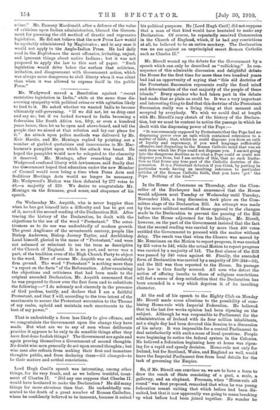On Wednesday Mr. Asquith, who is never happier than when
he has got himself into a difficulty and has to get out of it, moved the second reading of the Declaration Bill. After tracing the history of the Declaration, he dealt with the objections to the use of the word " Protestant." The sensi- tiveness as to its use was undoubtedly of modern growth. The great Anglicans of the seventeenth century, people like Bishop Andrewes, Bishop Jeremy Taylor, and Archbishop Laud himself, gloried in the name of " Protestant," and were not ashamed or reluctant to use the term as descriptive of the Church of England. It is no part, and never was a part, of the tradition even of the High Church Party to object to the word. Here of course Mr. Asquith was on absolutely firm ground. The word " Protestant" is nothing more than " a report on the facts " of the Reformation. After examining the objections and criticisms that had been made to the original amended Declaration, Mr. Asquith announced that he was prepared to throw over the first form and to substitute
the following I do solemnly and sincerely in the presence of God profess, testify, and declare that I am a faithful Protestant, and that I will, according to the true intent of the enactments to secure the Protestant succession to the Throne of my realm, uphold and maintain such enactments to the best of my power."






































 Previous page
Previous page